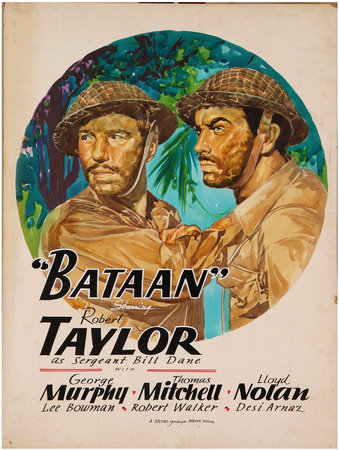
BATAAN
US, 1943, 114 minutes. Black and white.
Robert Taylor, George Murphy, Thomas Mitchell, Lloyd Nolan, Lee Bowman, Robert Walker, Desi Arnaz, Barry Nelson, Phillip Terry, Kenneth Spencer.
Directed by Tay Garnett.
Bataan is a re-enactment of the American forces digging in on the Bataan peninsula in the Philippines in 1942. Their courageous stand (and the film is dedicated, reverently, to them) enabled General Macarthur to form an army and then move to Australia to plan the return to the Philippines. Eventually, the Americans were defeated as was the island of Corregidor in Manila Harbour.
The film is very earnest, a flag-waving exercise for Americans coming towards the end of World War Two. It also pays tribute to the Filipinos. It paints the Japanese as a vicious enemy.
However, given the production values at MGM, it is a rather superior war film, not so much emphasising action but focusing on the characters of the group left to defend a valley against the Japanese advance.
The film also has a very strong cast. Robert Taylor is at his strong best as the sergeant in charge of the small group of thirteen who gradually diminish because of the onslaught of the Japanese as well as of malaria. Lloyd Nolan plays a rogue soldier who had encountered Taylor in the past but now has a new identity. He and Taylor are the final two to survive. Lee Bowman is the captain who is killed. George Murphy is a pilot trying to get his plane going again but who is wounded and does a kind of kamikaze crash into the bridge which the Japanese have been continually rebuilding after bombardment by the Americans. The supporting cast includes Thomas Mitchell in a strong older role as a corporal, Robert Walker as a very young and naive sailor who gets caught up with the army, Desi Arnaz as a Latin American soldier, Barry Nelson as an expert on explosives as well as Kenneth Spencer, a black actor who had appeared on stage in Show Boat, having a very strong bass baritone voice which is resounding here. (Spencer also made Cabin in the Sky at this time but, after work on stage, went to live in Germany where he made many films. He appears as himself in Melvin van Peebles’ Classified X (1998), a documentary about race stereotypes in American movies.)
It is interesting to see MGM promoting Spencer at this particular time.
The film was directed by Tay Garnett, one of the regular directors at MGM, making such films as The Postman Always Rings Twice.
1. The impact of this war film? In the 1940s? Now? Its perspectives on the war in retrospect?
2. MGM values, black and white photography, jungle locations, the Philippines and its atmosphere? The musical score?
3. Audience knowledge of Bataan, the peninsula, south of Manila, near to Corregidor in Manila Harbour. The Japanese invasion of the Philippines in 1942? The capture of Manila? The American forces resisting the Japanese on Bataan for several months? Delaying the advance to Corregidor? Giving time for Macarthur to form an army and to go to Australia to plan the return?
4. The convention of the small group and its interactions, its fights? Its heroism?
5. The introduction to the characters? The Japanese advancement, bombardments? The isolated groups? In the mountains? The captain and his trying to organise his remnant? His relying on Sergeant Dane? His being killed and Dane taking over?
6. Dane, Robert Taylor and his strong presence? In command? His background? His relationship with the men? Stern, authoritative? His strategies? His doubts? Whether to pull out because he had done all that could be done? The bombarding of the bridge and his daring attempt and success? His reaction to the deaths of the men? Discussions with the pilot? Relying on Jake Feingold? The interactions with Barney Todd, knowing him from the past, Todd escaping? The tensions between their interactions, his conversation indicating that he remembered the past? The finale, Todd dying, going back to his name? Dane saying he could have a loss of memory? Todd dying heroically? Dane and the discipline with Leonard and his immaturity? Ramirez and his suffering from malaria? Salazar and his attempt to contact Macarthur and his being hanged? The various men and the routines? The final conflict, the hand-to-hand fighting? The film ending as he defended his position against the Japanese – in the face of certain death?
7. Steve Bentley, genial, the pilot, fixing his plane, giving advice, the takeoff, the cover with machine gun fire, his being wounded, the explosives, crashing into the bridge?
8. Jake Feingold, his background, age, his bunions? Morale?
9. Leonard, young, in the navy, his background, the cornet? Naivety, wanting to kill Japs? Burying the dead? Learning from Dane? The poignancy of his letter to his mother – and his death?
10. Ramirez, Mexican, part of the squad, heroism, his death from malaria?
11. Matowski, American background, working with Epps, going up the tree for surveillance, his death?
12. Hardy, his joining up, non-combatant, his illness, going on the plane, his going out against the enemy with the hand grenades?
13. Epps, the African American, his voice, his genial presence, his skill at his work with explosives, on the bridge?
14. Salazar, the Filipino, loyalty, his decision to walk – his being caught, hanged?
15. The overall effect of watching the group at work, gradually diminishing, not wanting the Japanese to know how few they were?
16. The final attack, the Japanese using the Macbeth technique of having the trees and moving with them? The small group firing on them? The hand-to-hand combat – unrealistically filmed, the Americans able to vanquish with seemingly little effort? The morale-boosting effort?
17. The information, the tribute to the troops? The place of this film in the war effort? John Wayne and Anthony Quinn after the war – Back to Bataan?